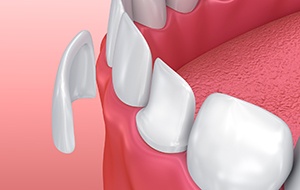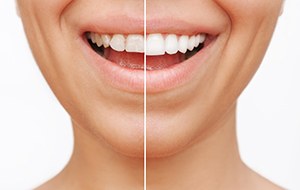
Veneers – Canonsburg, PA
Transform Your Smile, Transform Your Life!
Have you been unable to achieve the results you desire with whitening treatments? Do you want to improve the size, shape, and symmetry of your teeth as well? If so, it’s time to schedule a consultation with Dr. Raj to discuss veneers! This cosmetic dentistry treatment is widely loved because it can address multiple imperfections at once, leaving you with that vibrant white smile that you have been dreaming of for so long. To learn more, read on or get in touch with our Canonsburg dental team.
Why Choose Center One Dental For Veneers?
- Dentist with Well Over a Decade of Experience
- Convenient Appointment Times
- Flexible Financing Available
What Are Dental Veneers?

Veneers are naturally tooth-colored shells that are placed on top of the visible surfaces of your front teeth. These are permanently bonded to the teeth, brightening their color and correcting their shape. In fact, the following issues can be eradicated with veneers:
- Discolored teeth
- Chipped, cracked, or broken teeth
- Uneven spacing between teeth
- Misaligned teeth
- Unusually shaped teeth
The Process of Getting Veneers

The first step is meeting with Dr. Raj so he can determine if veneers are the best smile-enhancing treatment for you. If they are, then he will start working on your custom treatment plan, and you’ll work together to determine the best shape, size, and shade of each veneer. Once this is complete, he will “prep” your teeth, which involves removing a sliver of enamel. He’ll take the necessary impressions at this point, send everything to the dental lab, and adhere the temporary set of veneers.
Typically, the lab artisans need a few weeks to craft the veneers. As soon as they arrive at our office, we will closely inspect them to ensure they are perfect. If everything looks good, then we will schedule your final appointment. At this time, we will remove your temporary veneers, bond your final ones in place, and make any final adjustments that are needed to ensure you leave our office with your dream smile.
The Benefits of Veneers

Veneers continue to be widely loved by patients, dentists, and even celebrities for many reasons, including:
- The treatment process often only requires three visits.
- Multiple dental imperfections can be addressed at once.
- The materials used, like dental porcelain, are stain-resistant.
- They can last for a decade or more if maintained properly.
- No special oral care is needed – just brush and floss like normal!
Understanding the Cost of Veneers

Unfortunately, we can’t provide you with an estimate here. In fact, even general price ranges can be misleading because there are so many factors we need to take into account, including how many veneers you need. Don’t worry – that doesn’t mean we will leave you in the dark when it comes to the cost. At your consultation, we can provide you with a number and review all of the financial solutions we offer so you feel confident moving forward.
Veneers FAQs
Are Veneers Permanent?
Veneers in Canonsburg provide long-lasting results, but they aren't permanent. Veneers are meant to last for 10 years or longer with the correct care, like brushing and flossing. Even with the best care, you will need replacements eventually. Although veneers don't last forever, they aren't reversible because your cosmetic dentist must shave off some enamel to apply them to your teeth. This does not damage your teeth, but your enamel will not grow back if your veneers are removed. Your teeth will be vulnerable to bacteria, sensitivity, and damage if not always covered by restorations, whether veneers or crowns.
How Many Veneers Will I Need?
It is entirely possible to place a veneer on a single tooth, such as to fix a chip or cover a stain. However, the goal of the procedure is to enhance your smile overall. Therefore, your cosmetic dentist in Canonsburg will likely recommend applying them to the teeth that show when you smile. Since every smile is as unique as fingerprints, there's no way to know how many you'll need until after examining your mouth. Some patients require 6 or 8, but other people may need 10 or more to ensure seamless results.
How Long Do Veneers Last?
It's not uncommon for veneers to last for a decade or longer. You can ensure your dazzling smile lasts by using non-abrasive dental products to brush your teeth at least twice a day for 2 minutes. Floss your teeth daily to remove the buildup your toothbrush can't reach. Although veneers can't get cavities, your underlying teeth are still vulnerable to decay, so you'll want to limit sugars and starches. Moderate your consumption of hard and chewy foods. Protect your smile with an athletic mouthguard if you play sports. Schedule a cleaning and checkup with your dentist every 6 months to keep your mouth healthy, ensuring your veneers last their longest.
Do Veneers Make Your Teeth Sensitive?
You must sacrifice some enamel to benefit from veneers, but you don't have to worry about tooth sensitivity. Often, veneers are recommended for patients with a history of sensitive teeth because they provide an added layer of protection for people with weakened enamel.
What Do Veneers Feel Like?
It may take a couple of days to get used to your veneers, but you may soon forget that you have them. Advanced technology is used to craft each veneer to fit your tooth like a glove. Veneers are made of porcelain because it resembles enamel and are durable. As a result, veneers are thinner than ever before, so they will sit flush with no uncomfortable ridges or ledges. Your teeth will feel smooth and sleek. They won't be heavy or bulky for results that look and feel natural.
What Happens to the Teeth Under Veneers?
The great news is that your veneers themselves will not harm your teeth. Thankfully, only a very minimal amount of enamel will need to be removed from each tooth, and the bonding material used to attach them is completely safe.
Because the enamel will be covered by your veneer, the procedure will not increase your risk of cavities. However, you will still need to brush and floss your teeth regularly to prevent tooth decay from occurring underneath your veneers.
You can protect your teeth and your veneers with the same oral hygiene practices, including brushing twice a day with a soft-bristled toothbrush, flossing, limiting the amount of sugar you consume, and visiting Dr. Vekariya regularly for exams and cleanings.
Is There Anything I Can’t Eat with Veneers?
When you’re wearing temporary veneers in the weeks before your permanent ones are made, you’ll need to avoid hard foods like ice, raw fruits and vegetables, and hard candies, as these could break your restorations.
Also, avoid sticky foods that could pull the veneers off your teeth.
Temporary veneers stain more easily, so be careful eating darkly pigmented foods and beverages.
The good news is that you can enjoy most foods again once your permanent veneers are in place; however, you should still avoid extremely hard or crunchy foods as well as dark beverages which could cause stains.
If your teeth are sensitive after the placement of your veneers, avoid anything hot or cold. Furthermore, drink alcohol sparingly, as it can easily weaken the bonding material holding your veneers in place.
Do Veneers Give You a Lisp?
Some people do report difficulties pronouncing certain words when they first get veneers, resulting in a temporary lisp. This is usually due in part to muscle memory. Because the tongue is not used to accounting for the presence of your new veneers, the difference in thickness of your teeth can affect how your tongue moves.
This usually occurs when pronouncing “s” and “v” sounds.
The good news is that your tongue should eventually adjust on its own, although practicing pronunciation of certain sounds can help speed up the process.
In some cases, Dr. Vekariya can slightly reduce the thickness of your veneers in a certain area to help encourage the lisp to go away.
Can You Whiten Veneers?
Whitening procedures don’t have any effect on veneers if they have become stained. If this occurs, you will need to have them replaced or shaded instead.
However, whitening treatment will still affect the teeth around your veneers, and as a result the tone of your smile could become uneven.
Thus, if you’re planning to have both whitening and veneers done, start with whitening so your veneers can be color-matched to your teeth as they currently appear.